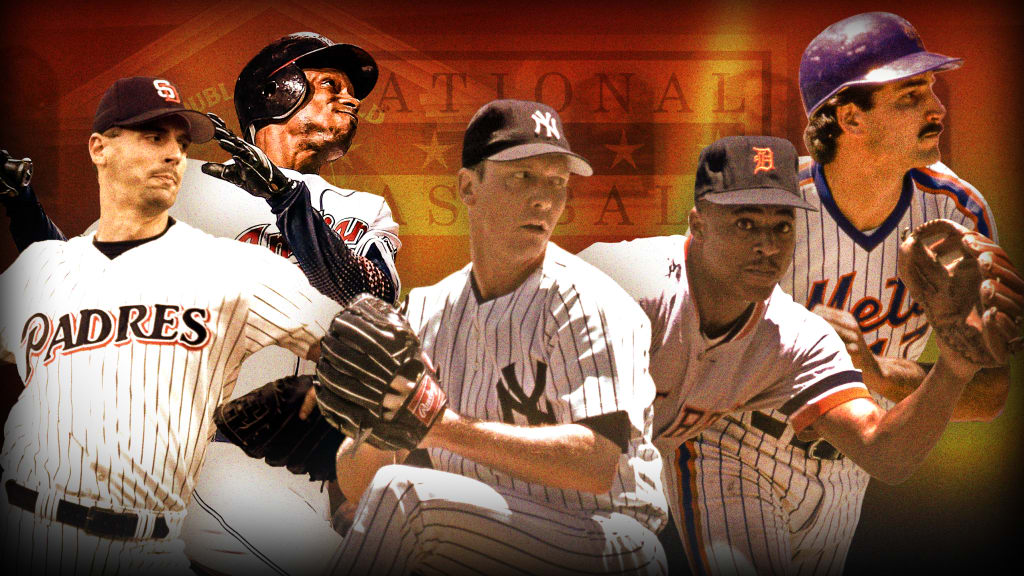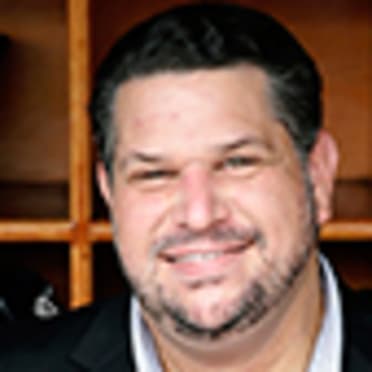
As baseball has evolved through the years, metrics and data not available a generation ago have changed the way teams are built and how players are evaluated.
Have Hall of Fame voters adjusted with the times? With the Hall announcement arriving Tuesday, a group of MLB.com reporters gathered to debate which players from generations past might have a better chance for election, or at least received more support, if they were on the ballot today.
Alyson Footer, editor/moderator: I think this is an intriguing topic for a couple of reasons: one, we have so much more data available to us now; and two, the current generation of Hall voters skews younger, and they take into account metrics that weren’t available a couple of decades ago. There has been a such a shift (see what I did there?) in what seems to be “important.”
With all of that said, David Cone really stands out to me as someone who might fare differently today, so let’s start with him. I think we can all agree that while he probably wouldn’t be elected today, he surely would have gotten more support. He got 3.9 percent of the votes on his first try and fell off the ballot. Yeesh.
Mark Feinsand, executive reporter: Cone’s chances would have been far better today than they were when he hit the ballot in 2009.
Mike Petriello, senior analyst: Mark, not to make you feel, you know, ancient, but you were much more of a full-time baseball writer in 2009 than Sarah and I were. Can I assume his lousy vote total was just because "not enough wins"? Because that's not a thing we'd even look at today in almost any way. If you look over at Jay Jaffe's JAWS board (so, WAR, but focused on the Hall), Cone = Juan Marichal. That's a good start.
Feinsand: It was less than 15 years ago, but I think voters (of which I was not yet one) were still used to seeing round-number milestones. Cone’s 194 wins might not have felt “Hall-worthy” at the time, when we still had pitchers with 250-300 wins getting in. But the rest of his resume is quite impressive.
Five All-Star appearances, a Cy Young, three other top-four finishes, 61.6 bWAR, five World Series rings. His case should have been FAR more compelling. For what it's worth, 2009 was only my third year in the Baseball Writers' Association of America, so I take no responsibility for Cone’s one-and-done fate.
Sarah Langs, researcher/analyst: I love to look at JAWS -- which considers WAR and peak years, too. There’s a starting pitcher-adjusted peak 7-year WAR for him at 43.3. The average of starting pitcher Hall of Famers is 40.7.
(I won’t say what grade I was in in ’09.)
Petriello: That's a good point that has nothing to do with Cone specifically: I think you have to throw out ALL of the award stuff now. All of it! Because it's based on older evaluations. Like recently I compared Bobby Abreu to Tony Gwynn, and a lot of the reaction was, well ...
Even if you don't care about batting average, Tony made so many more All-Star Games. He was more appreciated in his time. Which, sure, yes. But that's because of batting average, which is exactly the opposite of what we're trying to do here.
Feinsand: Let’s not get into the ludicrous Gwynn/Abreu comp, please. I’m begging you.
Some critics will say Cone’s 3.46 ERA was too high, but given that he pitched virtually half his career in the AL East during the pre-PED testing era, I’d say 3.46 was pretty darn impressive.
Langs: 121 ERA+ … identical to Don Drysdale.
Feinsand: Drysdale was pretty good, if I’m remembering correctly.
Langs: Research confirms.
Petriello: I'm in favor of Cone getting in. But I also don't think he's a slam dunk. He'd do much better today. I'm not actually convinced he'd get in.
Footer: I don't think he'd ultimately get in. But he would absolutely not be a one-and-done.
Feinsand: I’m not convinced he would get in, either. But I would bet my house that he would get more than 3.9%.
Footer: Ahead of this debate, we put together a list of players who might/should get more consideration if on the ballot today:
Which Hall omission baffles you the most?
Feinsand: Whitaker is the one that I’m always confused about. I don’t understand how he’s not in the Hall.
(Editor’s note: Whitaker garnered 2.9 percent of the vote his first year of eligibility and fell off the ballot.)
Petriello: Whitaker or Lofton, maybe.
I think this goes back to what I was saying before, about "fame in their time." Lou had only five All-Star Game appearances and had top-10 MVP votes exactly one year. Of course, he also put up a nearly 7-WAR season in 1991 and got absolutely nothing out of it. I'm supposed to now worry about how voters rewarded him 30 years ago? Nah.
Langs: Whitaker’s 75.1 career WAR is seventh among second basemen.
Feinsand: He compares favorably to Roberto Alomar, Craig Biggio and about a half-dozen second basemen in the Hall. His WAR is quite high. Why isn’t he in?
Petriello: This is the list everyone would use for Whitaker.
The highest WAR among all players not in the Hall of Fame, Whitaker is eighth. But a few of those guys are PED cases, one's Pete Rose, one was born in 1870. Albert Pujols and Adrián Beltré are clearly getting in. You can make an easy case Whitaker is the best non-PED player who isn't in the Hall. (Mike Trout is fifth and obviously still an active player.)
Feinsand: Whitaker’s career was over before I graduated college. I’m not sure I ever appreciated how good he was while I was actually watching him play, but if he was on a ballot today, he would certainly get my vote. I think a lot of voters 20+ years ago went by the “eye test” and traditional stats -- because that’s all they had to go by. Whitaker would be a near-certain Hall of Famer if he was on a ballot today.
Petriello: Lou had 18 years of more than 250 plate appearances. And he was average or better, in terms of OPS+, 17 times. That's incredible.
Footer: Let’s examine Keith Hernandez. While I don't think he would gain election today, I think he would definitely get more support. He barely stayed eligible for eight years on the ballot. I think he peaked at around 10 percent. That certainly would not be the case today.
Feinsand: Hernandez’s offensive numbers don’t stand out. He had a great OBP (.384), but not enough power for a first baseman. And while he was a superb Gold Glove first baseman, that’s not a position that garners much respect defensively. I think Don Mattingly is a much stronger candidate than Hernandez, and I’m not convinced Mattingly is a Hall of Famer, either.
Langs: Hernandez’s JAWS, WAR and peak 7-year WAR are each just below the average of the 24 Hall of Fame first basemen. I think he’d get above 10 percent.
Petriello: I think his argument rests on him being "the best defensive first baseman of all time," which I'm not stipulating he is, just that's what his main case is. Obviously, 11 Gold Gloves backs that up. But then Gold Gloves even today are questionable, so I'm really not putting anything into what they were in the 1970s. but then I do think he was an all-time great defensive first baseman, so maybe I'm talking myself into circles here.
Anyway, 162 home runs from a first baseman is a pretty low total, even if we're trying to look at advanced stats. I think what would happen here is you'd see he's just a bit below average for Hall of Fame first basemen, which is still really quite good. I'm guessing he'd top out at, I don't know, 40 percent.
Feinsand: I definitely think Hernandez would hang on the ballot for the maximum 10 years, but I don’t think he would come close to getting in.
Petriello: Get back to me after Todd Helton gets in, mostly.
Feinsand: To get into the Hall based more on defense than offense, you need to shine at a premium defensive position, a la Ozzie Smith.
Andruw Jones is having a tough time on the ballot, and in addition to being a great center fielder, he had an insane 10-year offensive run to go with it.
Petriello: A lot of it comes down on how you want to compare to players already in. Do I think Hernandez is a Hall of Famer? Eh, borderline. Would I vote for him ahead of Fred McGriff? Uh, quite possibly.
Footer: You'd vote for Hernandez ahead of McGriff?
Feinsand: I would not have voted for Hernandez ahead of McGriff. But Mike is smarter than I am (or at least thinks he is).
Petriello: I would consider it. No doubt that McGriff was a more powerful hitter. Hernandez was a massively better defender, because McGriff was below average there, and he played in a much, much more difficult offensive environment/era. And if we're trying to wrap this up into advanced metrics, well ...
Hernandez: 60.3 WAR and 50.8 JAWS
McGriff: 52.6 WAR and 44.3 JAWS
I'm not saying I'd do it or that this is really the hill I'm dying on. I'm saying it's not hard even a little to make the case.
Keith had a 128 OPS+ and was a fantastic defender. Fred had a 134 OPS+ and was a poor defender. It's not that hard.
Feinsand: Lofton is another guy who I believe would have had a far better fate on the ballot if he debuted today.
Footer: Lofton is a guy that most likely wouldn't be a one-and-done today, do we all agree on that? (Editor’s note: Lofton received 3.2 percent of Hall votes his first year of eligibility in 2013 and fell off the ballot.)
Petriello: Yes. it was a crime how quickly he was bounced. He's a huge victim of the extremely silly "max of 10 names" rule. In his year, in 2013, we already have 10 guys who eventually got in, and others who have on-field cases but got caught up in PEDs. Was he one of the 10 best on the ballot that year? No. Should it matter at all? Ab-so-lute-ly not. Give the man the respect of a yes/no vote.
Feinsand: He falls into one of those “tale of two careers” narratives. From 1992-2000, he had a .308/.385/.431 slash line with 950 runs scored, 461 steals and a 113 OPS+.
From 2001-07, he slashed .288/.354/.415 with 569 runs scored, 159 SB and a 101 OPS+. Still good, but a dropoff for sure.
He wouldn’t be one-and-done today, but I think it’s a stretch to think he would have gotten in.
Langs: I return to JAWS. Lofton:
68.4 WAR
43.4 peak 7-year WAR
55.9 JAWS
Averages for 19 Hall of Fame center fielders:
71.6 WAR
44.7 peak
58.1 JAWS
Riiiight there -- he would definitely get more consideration.
Petriello: I think Lofton's also been hurt by the weird "I played for Cleveland for 10 years and then 10 other teams for a year each" stretch. Would it be different if he had the exact same career, but over 20 years with Cleveland? It shouldn't matter, but it would have.
Footer: Of the names on this list, who would you vote for today, if they all appeared on a ballot and you were voting? Let's pretend there isn't a 10-player max.
Petriello: Lofton. Whitaker. Grich. I think are my no-doubt yesses. Probably also Brown and Evans. So those five.
I'd strongly consider Edmonds. I'll stick with five though.
Langs: Whitaker, Lofton, Grich, Brown, Evans. And Cone, I think.
Feinsand: I would probably vote for Whitaker, Cone, Lofton, Evans and Grich. Brown and Belle would be close.
Albert Belle was a FORCE from 1991-2000. He retired at 33 after a very good year. And people hated him.
Petriello: I do enjoy how pro-Belle people are all, “You just don't want him in because he was mean to you.” And then I can say: “My friends, I was in middle school.”
Footer: Kevin Brown seems to have one of the more compelling cases. And he was also a one-and-done, off the ballot after checking in at 2.1 percent in his first year.
Feinsand: Brown’s career was excellent. Like Belle, people didn’t like him. And he pitched for six teams, so he’s not associated with any one in particular. I think that affects some players’ candidacies.
Petriello: Bill James actually looked into this last year, and found that Hall of Famers who played for a lot of teams really did get hurt in voting compared to players identified with one team.
Langs: Brown had the first $100 million contract, which is not a reason itself, but it is notable in baseball history.
Feinsand: He had 3,256 1/3 innings pitched over 19 seasons. The guy was a horse. From 1996-2003, he had a 2.60 ERA. Those were the final eight seasons before PED testing began.
Langs: His 44.6 JAWS score is ahead of the existing Hall of Fame starting pitcher average of 40.7.
Petriello: Brown, by JAWS, is an average Hall of Fame pitcher, which is extremely good. He's above John Smoltz, Juan Marichal, Jim Palmer, Don Drysdale and Bob Feller ... absolute kings. And his peak was incredible; he had, by Baseball-Reference, four seasons of 7+ WAR.
Petriello: People get angsty that Hall of Fame voting isn't exactly what they, personally, want it to be. But I think that's part of the fun, arguing about who is in and who is not.
Footer: Agree. We didn't even get to my Houston-based biased argument that Jeff Kent should be in, and Lance Berkman and Roy Oswalt should not have fallen off on the first ballot. Travesties all around.
Feinsand: I voted for Kent.



